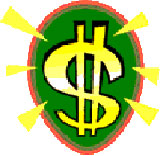|
 It is only appropriate that an Irish immigrant to the
United States be the one credited with originating the dollar sign.
Oliver Pollock sailed the high seas at the age of twenty-three, and
settled in Carlisle, Pennsylvania. This
young entrepreneur rapidly established himself as a wealthy and
influential West Indies trader. It is only appropriate that an Irish immigrant to the
United States be the one credited with originating the dollar sign.
Oliver Pollock sailed the high seas at the age of twenty-three, and
settled in Carlisle, Pennsylvania. This
young entrepreneur rapidly established himself as a wealthy and
influential West Indies trader.
Pollock moved his operation to Louisiana, where he amassed even
more wealth as a trader, and as a plantation
owner. His success enabled him to provide supplies to the
Patriots' cause in the Revolutionary War, and to maintain close
contact and a degree of influence with Congress. Pollock's success
allowed him easily to purchase military supplies to support "the
cause," as the Spanish Empire had an outpost in New Orleans, Louisiana. In his
dealings with the Spaniards, Pollock used their currency, the peso.
In true Spanish tradition, Pollock used an abbreviation for
pesos, yet his penmanship made the
abbreviation appear to be the transposition of the letters "p" and
"s."
Prior to 1775, the fledgling nations monetary system was in disarray, and needed
to be revamped. By 1775, Congress
decided to rectify the situation by backing all of its legal tender
with the most commonly circulated coins that were, coincidentally,
Spanish coins minted in the New World. Americans then began trading
with "Spanish milled dollars," later termed "dollars," as Americans
shed the "pounds" that were the vestiges of British rule.
Congressman Robert Morris, to whom Pollock addressed his billing
records, perpetuated the use of the dollar sign, and was the first
high government official to give his blessing to the "s" with the
two lines through it.
The appearance of the dollar sign in print, in a 1797 book by
Chauncey Lee, signified the acceptance of the dollar as a purely
American symbol.
|
|
note:
|
Carlisle: 卡莱尔
influential:有影响力的
plantation owner: 种植园主
outpost: 前哨
peso: 比索
penmanship: 书法
monetary system:
货币体系
revamp: 修补
vestige: 残余 | |